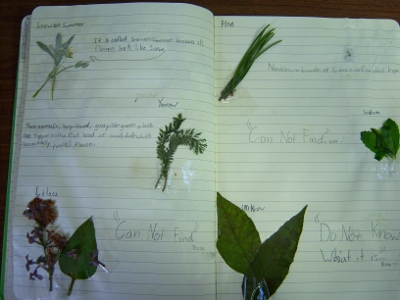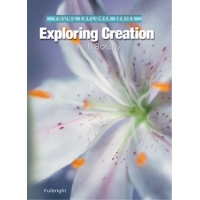Surrounded by our plant and tree guide books, Miss 10 sits at the table, half hidden by my 24th anniversary roses. She’s working on her final botany project: making her own guidebook of some of the trees and plants on our property. Then she will be finished an entire year of Exploring Creation with Botany by Jeannie Fulbright.
A whole year of botany at age 10? How could that be? Well, rather than just skimming the surface, this text gets really in depth so that the children will know a lot about botany by the time they are done…and hopefully remember more because they were immersed in it for a whole year. Does this lead to one-sided learning? In a sense, yes. But because of her older siblings, her other required science reading, her nature notebook, and our outings, Miss 10 learns many other aspects of science as well.
Miss 10 has known a lot about plants since she was a toddler and loved to nibble from the garden. That’s when we started to teach her what plants and plant parts are edible and what she should never taste: rhubarb leaves, pepper and tomato leaves, wild nightshades, wild elderberries; or touch: poison ivy, nettles, parsnip leaves. Soon she learned which plants are weeds and what weeds are safe to feed the chickens. Now she can weed. For a 10 year old, she knows plants well.
Even so, there was a huge amount of new information in Jeannie Fulbright’s Botany. Most of the new material involved classification and Latin names. The names did not stick so well, but I think the classification was handy to organize all the information she already has. She learned about shapes of leaves, different kinds of seeds, what mosses really are, how bark works, the many kinds of fruits, pollination, how different plants reproduce, what’s so special about the underside of leaves, the significance of green, and even more.
Jeannie Fulbright’s Botany is organized into 13 colorful and chatty chapters, and we studied one every two or three weeks. We used the “What do you remember?” questions as narration guides and read most of the book aloud together on the couch. For each chapter, I required some work in her binder: pictures, a summary, an experiment report, or something similar. At 10, she has not yet mastered note taking, but occasionally she would choose to use the text for copywork. She enjoyed tracing many of the pictures. And occasionally she was totally captivated by a project, like her guidebook which now takes up several pages in her nature notebook.

Of course, Miss 10 could not find information about every plant, but she could pick the leaves for her guidebook.
Although Miss 10 is a hands-on kind of girl, we did not do many of the experiments in the text. Many of them were already familiar to her because of our everyday outdoor life in the gardens and the woods.
After spending a year studying botany with Jeannie Fulbright, Miss 10 is better prepared to enjoy God’s green world that is all around her. Even if she remembers only a little, she will also have a head start on the high school Apologia Biology course that our teens take in grade 9.
One delightful aspect of Exploring Creation with Botany is that Jeannie Fulbright assumes creation rather than evolution. She shows how discoveries about plants confirm the Bible’s creation account, and her book glorifies God.
Most of our other children have also studied Fulbright’s Botany. I feel sad that this was the last time we would be using it for school, but we will keep the book as a reference. We have enjoyed it so much that we would hold on to it as a keepsake even if it weren’t a useful reference!
Disclosure: We bought Apologia’s Exploring Creation with Botany by Jeannie Fulbright years ago. We have also enjoyed Fulbright’s Astronomy and Flying Creatures of the Fifth Day.
This is yet another book in the in the 2012 52 Books in 52 Weeks Challenge, and is also linked to Saturday Reviews, Trivium Tuesdays, the Carnival of Homeschooling, and the Apologia Year-End Round Up.



I love the Exploring Creation books. I think we are doing Apologia general science next year because I have the book already, although, my daughter would probably like botany better. We did zoology 3 this year. I really enjoyed this year. What are you doing next?
I’m not sure what we’ll do next year. Zoology 3 sounds just perfect for Miss 10, but we haven’t made up our minds yet. We will certainly continue with our math/science reading though.
Your daughter will find General Science to be quite a change, but it can be so fascinating too!
Oh my goodness, I so love the field guide! We are in the middle of a 1/2 yr study of botany, also using Apologia and are really enjoying it (1st grade level). Just yesterday we pressed a few dozen flowers with the hopes of putting them into our nature journal, but I think after seeing this, we will extend it to leaves of other plants here in our woods as well, as your daughter did. Gardening has also been a wonderful hands-on way for me to do botany together with my children. What a blessing to learn alongside them. Thanks for the review~love Apologia!
I’m so glad you liked the field guide. It makes me happy to look at the wonderful work Miss 10 has done. There’s something about home-made plant field guides that always enthralls me, but it’s even better when my own child has made it! 🙂
I’m glad you’re enjoying the outdoors with your little one. Apologia will help with that, we’ve found.
I really wanted to use that book as a summer science course this year, but decided to take it a little easier and will probably use it next year. Thanks for sharing your thoughts about it and how you used it!
If you just use a guidebook and observe plants this summer by starting a nature journal, you’ll be so much more ready for that book this fall! Enjoy!
[…] been doing with Apologia Exploring Creation Science. Annie Kate shared how her daughter used the Botany course this last year and Gena shared lots of activities and pictures of what her children have […]